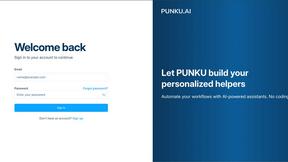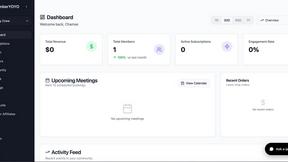Best No Code & Low Code tools (4+)
Discover 4+ best no code & low code tools. Compare features, pricing, and reviews. Free and paid options available.
PUNKU.AI
PUNKU.AI lets you automate tasks effortlessly in plain English, building and managing AI solutions without any coding.
Roast My Web
Roast My Web delivers quick, actionable website audits to boost UX, SEO, and conversions in just 2 minutes.
MemberYOYO
MemberYOYO is the all-in-one platform to build, manage, and monetize your own membership business effortlessly.
Job Boardly
Job Boardly is a no-code platform that lets anyone launch and monetize a custom job board in minutes.
FAQs for No Code & Low Code
How does the No Code & Low Code Category improve application development?
The No Code & Low Code Category improves application development by enabling users to create applications swiftly without extensive coding knowledge. This approach reduces reliance on developers, accelerates the development cycle, and allows businesses to prototype ideas quickly, addressing market needs more efficiently.
What are the main features of No Code & Low Code platforms?
The main features of No Code & Low Code platforms include intuitive visual development tools, pre-built templates, and robust integration capabilities. These features empower users to build applications efficiently, foster collaboration among teams, and allow for quick adaptations in response to evolving business requirements.
In what scenarios is the No Code & Low Code Category most beneficial?
The No Code & Low Code Category is most beneficial in scenarios where rapid application development is needed, such as launching new services, automating workflows, or creating custom tools for specific business needs. It enables teams to address challenges quickly and efficiently without significant technical expertise.
What makes No Code & Low Code tools unique from traditional development methods?
No Code & Low Code tools are unique from traditional development methods due to their user-friendly interfaces that require little to no coding skills. This democratization of software development allows a broader range of individuals to participate in creating solutions, significantly reducing time and cost barriers associated with conventional programming.
What benefits do organizations experience by adopting No Code & Low Code solutions?
Organizations adopting No Code & Low Code solutions experience benefits such as increased agility, improved speed of deployment, and reduced development costs. These tools empower non-technical staff to contribute to innovation, resulting in enhanced collaboration and efficiency in meeting business objectives.
How can users leverage No Code & Low Code platforms for their projects?
Users can leverage No Code & Low Code platforms for their projects by utilizing visual development tools to design applications tailored to their specific needs. This approach allows them to experiment, iterate quickly, and implement feedback to create effective solutions, transforming their ideas into functional applications without extensive coding experience.
You may also like
Payments
The Payments Category features advanced AI payment solutions for secure, efficient transactions.
Task Management
The Task Management Category streamlines project workflows and enhances productivity.
Blogging & Publishing
Blogging & Publishing Category facilitates content sharing, enhancing visibility and engagement.
Customer Support
The Customer Support Category streamlines support interactions, enhancing satisfaction through targeted assistance.
Business Intelligence
The Business Intelligence Category empowers effective decision-making through data insights, enhancing competitiveness.
Coaching
Coaching Category encompasses various coaching styles, providing tailored strategies for personal growth and performance improvement.
VR & AR
Discover the VR & AR Category, enhancing user engagement through immersive experiences.
Industrial Automation
Discover how the Industrial Automation Category boosts manufacturing efficiency and productivity.




